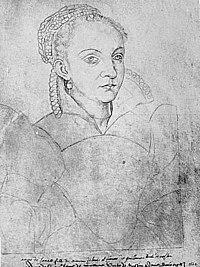Anna of Saxony
| Anna of Saxony | |
|---|---|
 |
|
| Princess consort of Orange | |
| Tenure | 25 August 1561 – 22 March 1571 (9 years) |
| Born |
23 December 1544 Dresden, Duchy of Saxony |
| Died | 18 December 1577 (aged 32) Dresden, Electorate of Saxony |
| Spouse | William I, Prince of Orange |
| Issue | Countess Anna Anna, Countess William Louis of Nassau-Dillenburg Count Maurice August Phillip Maurice, Prince of Orange Emilia, Princess of Portugal Christine van Dietz (illegitimate) |
| House | Wettin |
| Father | Maurice, Elector of Saxony |
| Mother | Agnes of Hesse |
Anna of Saxony (23 December 1544 – 18 December 1577) was the heiress of Maurice, Elector of Saxony, and Agnes, eldest daughter of Philip I, Landgrave of Hesse. Maurice's only son, Albert, died in infancy. Anna was the second wife of William the Silent.
Anna was born and died in Dresden. Her wealth drew many suitors; before the proposal of Orange in 1560, there were negotiations with the Swedish royal house. She accepted the suit of William I of Orange, and they were married on 25 August 1561.
After the death of her younger brother Albert (born November 28, 1545 † April 12, 1546), Anna grew up as an only child, and might have been spoiled by her parents, particularly her mother. There are indications that Anna suffered from a physical deformity (a back problem or uneven shoulders) and that she might have walked with a limp.
After her father's death on 11 July 1553, his younger brother, August (1526–1586), succeeded him as Elector of Saxony, resulting in a loss of Anna's in rank. Shortly afterwards, Anna's mother married Duke Johann Friedrich II of Saxony (1529–1595). On 4 November 1555, six months after her second marriage, her mother died under mysterious circumstances. The 11-year-old orphan then returned to her late father's Dresden court and was placed under the guardianship of her uncle August and his wife, Anne of Denmark and Norway. Sources indicate that the young princess chafed under her aunt's regime, was often unhappy and felt alone. At the same time, she was described as proud, defiant, and stubborn as well as intelligent and passionate.
Due to her late parents' legacies, Anna was considered the wealthiest heiress in Germany at the time. In 1556, Erik, son of the Swedish king Gustav Vasa, sought her hand in marriage, followed two years later by William of Orange. A marriage with a rich heiress and relation to the important electoral houses of Germany for him seemed of great value. Money may have not been one of the main motives for the marriage, but was probably the furthest planned course of the marriage. Anna's maternal grandfather, Philip the Magnanimous of Hesse, was opposed to the marriage. First, he did not consider William of Orange, already having a male heir, as befitting for an elector's daughter, believing she could marry someone of even higher rank. Secondly, there would have been too much debt incurred in the event of William's death. Philip's negative attitude delayed the marriage for a full year. Ultimately, however, the decisive factor was probably that William was a valuable ally for Germany and his Dutch resources for the Protestant cause.
...
Wikipedia
